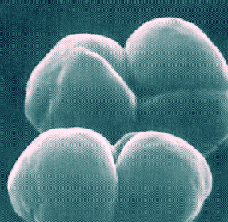
In the taxonomy of microorganisms, the Methanomicrobia are a class of the Euryarchaeota.
Psychrobacter is a genus of Gram-negative, osmotolerant, oxidase-positive, psychrophilic or psychrotolerant, aerobic bacteria which belong to the family Moraxellaceae and the class Gammaproteobacteria. The shape is typically cocci or coccobacilli. Some of those bacteria were isolated from humans and can cause humans infections such as endocarditis and peritonitis. This genus of bacteria is able to grow at temperatures between −10 and 42 °C. Rudi Rossau found through DNA-rRNA hybridization analysis that Psychrobacter belongs to the Moraxellaceae. The first species was described by Juni and Heym. Psychrobacter occur in wide range of moist, cold saline habitats, but they also occur in warm and slightly saline habitats.
Nocardioides aquaticus is a species of Gram-positive, non-motile and aerobic bacteria. Its type strain is EL-17KT.
Friedmanniella lacustris is a species of Gram-positive, non-motile and aerobic bacteria. Its type strain is EL-17AT.
Streptomyces hypolithicus is a filamentous bacterium species from the genus of Streptomyces which has been isolated from soil from Miers Valley in the McMurdo Dry Valleys in Eastern Antarctica.
Kozakia is a genus of bacteria from the family of Acetobacteraceae. Up to now there is only one species of this genus known.
Glaciecola is an aerobic bacteria genus from the family of Alteromonadaceae.
Psychroflexus gondwanensis is a halophilic bacteria from the genus of Psychroflexus which has been isolated from am organic lake in Antarctica.
Sphingomonas aerolata is a Gram-negative and psychrotolerant bacteria from the genus of Sphingomonas.
Sphingomonas aurantiaca is a Gram-negative and psychrotolerant bacteria from the genus of Sphingomonas which has been isolated from indoor dusts from animal sheds in Finland.
Sphingomonas faeni is a Gram-negative bacteria from the genus of Sphingomonas which has been isolated from indoor dusts from animal sheds in Finland.
Anaerostipes caccae is a Gram-variable, anaerobic saccharolytic, rod-shaped butyrate-producing and acetate and lactate-utilising bacterium from the genus of Anaerostipes which has been isolated from human faeces.
Aequorivita is a Gram-negative and strictly aerobic bacterial genus from the family of Flavobacteriaceae.
Hymenobacter aerophilus is a Gram-negative, non-spore-forming, aerobic and rod-shaped bacterium from the genus of Hymenobacter which has been isolated from airborne from the Museo Correr in Venice in Italy.
Aequorivita lipolytica is a bacterium from the genus of Aequorivita which occurs in sea water in the Antarctica.
Aequorivita sublithincola is a bacterium from the genus of Aequorivita which has been isolated from a quartz stone from the Antarctica.
Hymenobacter roseosalivarius is a Gram-negative bacterium from the genus of Hymenobacter which has been isolated from soil and sandstone from the Antarctica.
Microbacterium ketosireducens is a bacterium from the genus of Microbacterium which has been isolated from soil.
Tsukamurella strandjordii is a Gram-positive and aerobic bacterium from the genus of Tsukamurella which has been isolated from the blood of a young girl with acute mycelogenous leukemia.
Blastomonas is a Gram-negative, photoheterotrophic, strictly aerobic and non-spore-forming bacteria genus from the family of Sphingomonadaceae.
